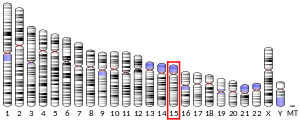DIS3L
Appearance
DIS3-like exonuclease 1 (Dis3L1 or Dis3L) is an enzyme that in humans is encoded by the DIS3L gene. Its protein product is an RNase enzyme homologous to the yeast protein Rrp44, and can be part of the exosome complex in the cytoplasm of eukaryotic cells.[5][6]
References
- ^ a b c GRCh38: Ensembl release 89: ENSG00000166938 – Ensembl, May 2017
- ^ a b c GRCm38: Ensembl release 89: ENSMUSG00000032396 – Ensembl, May 2017
- ^ "Human PubMed Reference:". National Center for Biotechnology Information, U.S. National Library of Medicine.
- ^ "Mouse PubMed Reference:". National Center for Biotechnology Information, U.S. National Library of Medicine.
- ^ Staals RH, Bronkhorst AW, Schilders G, Slomovic S, Schuster G, Heck AJ, Raijmakers R, Pruijn GJ (July 2010). "Dis3-like 1: a novel exoribonuclease associated with the human exosome". EMBO J. 29 (14): 2358–67. doi:10.1038/emboj.2010.122. PMC 2910272. PMID 20531389.
- ^ Tomecki R, Kristiansen MS, Lykke-Andersen S, Chlebowski A, Larsen KM, Szczesny RJ, Drazkowska K, Pastula A, Andersen JS, Stepien PP, Dziembowski A, Jensen TH (July 2010). "The human core exosome interacts with differentially localized processive RNases: hDIS3 and hDIS3L". EMBO J. 29 (14): 2342–57. doi:10.1038/emboj.2010.121. PMC 2910271. PMID 20531386.




